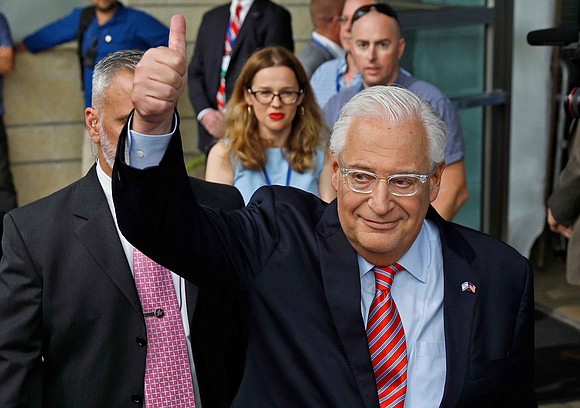State Dept. pushes back on Friedman comments about Israel's 'right' to annex West Bank
CNN/Stylemagazine.com Newswire | 6/11/2019, 3:25 p.m.
By Nicole Gaouette and Jennifer Hansler, CNN
(CNN) -- The State Department pushed back on comments by the US ambassador to Israel suggesting that Israel has a right to annex part of the West Bank.
State Department spokesperson Morgan Ortagus said the administration's position on the West Bank has not changed, despite Ambassador David Friedman's comments to The New York Times that "Israel has the right to retain some, but unlikely all, of the West Bank."
Speaking to reporters Monday, Ortagus said that "the administration's position on the settlements has not changed. Our policy on the West Bank has not changed."
Asked what the US position on settlement activity is, a State Department official cited President Donald Trump, saying that "as the President has said, while the existence of settlements is not in itself an impediment to peace, further unrestrained settlement activity doesn't help advance peace."
International law
Israeli settlement activity in the Palestinian territories is illegal under international law, though Israel has always sought to dispute this. The State Department official said they had nothing further to add when asked if the US considers Israeli settlement construction to be illegal.
Ortagus on Monday said there was no plan for any sort of disciplinary action against Friedman.
"The ambassador, the secretary and everyone who is involved in the Middle East peace plan, in this entire administration, is working towards a comprehensive and lasting peace between the Israelis and the Palestinians," she continued.
The State Department has been a junior partner in the administration's efforts to forge a resolution to the Israeli-Palestinian conflict. That initiative has been led out of the White House by Trump's son-in-law and senior adviser, Jared Kushner, along with Friedman and a former lawyer for the Trump organization, Jason Greenblatt.
'A significant change'
The trio has been promoting the economic aspects of their plan, saying they want to improve Palestinian quality of life, but downplaying the prospect of finding a political solution and playing down the long-standing formula of a two-state solution with both sides having a capital in Jerusalem.
Israeli Prime Minister Benjamin Netanyahu raised the prospect of annexing some parts of the West Bank in the final days of the recent election campaign in an effort to rally conservative voters. Asked if that move might hurt the chances of peace, Secretary of State Mike Pompeo told Jake Tapper in April, "I think that the vision that we'll lay out is going to represent a significant change from the model that's been used."
Aaron David Miller, a vice president at the Wilson Center and a CNN contributor, said that in previous administrations, Israeli settlement policy was "on the radar screen" as an issue.
Not on the radar
"It is now not on the radar screen and there is what I would describe as a willful acquiescence to the settlement enterprise," Miller said. "When no one challenges statements about annexation, including the secretary of state ... you can't help reach the conclusion that this is a fundamental reorientation in policy to basically undermine the traditional US approach" of a two-state solution and "some reconciliation between Israelis and Palestinians."
Other analysts raised the security implications of annexation.
The Israeli Policy Forum, a group that advocates for a two-state solution, said while Friedman's annexation remarks "are not surprising, given his long publicized pro-settlement and anti-two-state outlook, they are disturbing nonetheless." The Israeli security establishment, most major American Jewish organizations and pro-Israel members of Congress support the idea of two states, the forum said.
Annexation would be "deeply harmful to Israel's long-term future as a Jewish, democratic, and secure state," the forum said in a statement, adding that it would create an uncertain security and diplomatic environment for Israel, risk the collapse of the Palestinian Authority and "be a disaster for Israelis and Palestinians."




